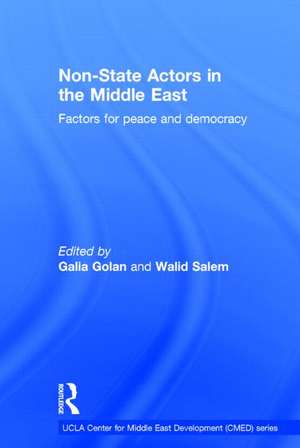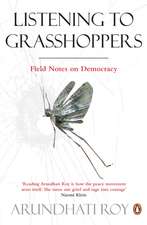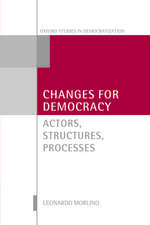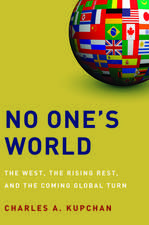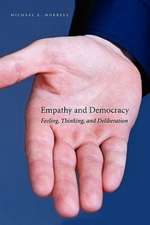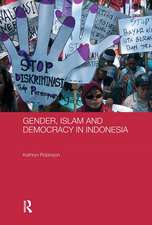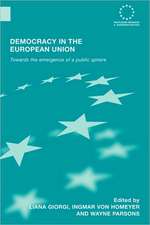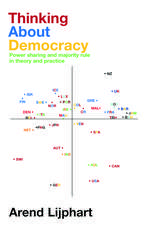Non-State Actors in the Middle East: Factors for Peace and Democracy: UCLA Center for Middle East Development (CMED)
Editat de Galia Golan, Walid Salemen Limba Engleză Hardback – 6 dec 2013
This volume brings together scholars primarily form the region to analyse the varied activities and contributions of NGOs, the private sector and the new media, from Morocco to Iran, along with the involvement of diaspora groups. The chapter on facebook in the recent Egyptian revolution captures the role of this new media while the study on similar technology in Iran outlines the barriers raised by the authorities in the current struggles there. Even the fledgling process of democratization in Saudi Arabia is driven by non-state actors while the veteran women's movements in the Maghreb serve as an example for the post-Arab spring era in those countries.
Providing one of the first assessments of the role of non-state actors in the Middle East, this book will be essential reading for students of Political Science, Sociology and Civil Society, amongst others.
| Toate formatele și edițiile | Preț | Express |
|---|---|---|
| Paperback (1) | 307.80 lei 6-8 săpt. | |
| Taylor & Francis – 5 dec 2013 | 307.80 lei 6-8 săpt. | |
| Hardback (1) | 698.17 lei 6-8 săpt. | |
| Taylor & Francis – 6 dec 2013 | 698.17 lei 6-8 săpt. |
Din seria UCLA Center for Middle East Development (CMED)
-
 Preț: 392.87 lei
Preț: 392.87 lei -
 Preț: 305.84 lei
Preț: 305.84 lei -
 Preț: 431.35 lei
Preț: 431.35 lei -
 Preț: 488.71 lei
Preț: 488.71 lei -
 Preț: 416.26 lei
Preț: 416.26 lei - 15%
 Preț: 426.20 lei
Preț: 426.20 lei -
 Preț: 489.26 lei
Preț: 489.26 lei -
 Preț: 443.78 lei
Preț: 443.78 lei -
 Preț: 413.33 lei
Preț: 413.33 lei -
 Preț: 430.94 lei
Preț: 430.94 lei - 26%
 Preț: 819.90 lei
Preț: 819.90 lei -
 Preț: 418.13 lei
Preț: 418.13 lei - 13%
 Preț: 337.39 lei
Preț: 337.39 lei -
 Preț: 415.24 lei
Preț: 415.24 lei -
 Preț: 369.43 lei
Preț: 369.43 lei -
 Preț: 360.43 lei
Preț: 360.43 lei -
 Preț: 363.53 lei
Preț: 363.53 lei -
 Preț: 366.68 lei
Preț: 366.68 lei -
 Preț: 366.47 lei
Preț: 366.47 lei -
 Preț: 387.42 lei
Preț: 387.42 lei -
 Preț: 385.08 lei
Preț: 385.08 lei
Preț: 698.17 lei
Preț vechi: 821.37 lei
-15% Nou
Puncte Express: 1047
Preț estimativ în valută:
133.59€ • 139.48$ • 110.57£
133.59€ • 139.48$ • 110.57£
Carte tipărită la comandă
Livrare economică 04-18 aprilie
Preluare comenzi: 021 569.72.76
Specificații
ISBN-13: 9780415517041
ISBN-10: 0415517044
Pagini: 240
Ilustrații: 2 tables and 2 line drawings
Dimensiuni: 156 x 234 x 20 mm
Greutate: 0.45 kg
Ediția:1
Editura: Taylor & Francis
Colecția Routledge
Seria UCLA Center for Middle East Development (CMED)
Locul publicării:Oxford, United Kingdom
ISBN-10: 0415517044
Pagini: 240
Ilustrații: 2 tables and 2 line drawings
Dimensiuni: 156 x 234 x 20 mm
Greutate: 0.45 kg
Ediția:1
Editura: Taylor & Francis
Colecția Routledge
Seria UCLA Center for Middle East Development (CMED)
Locul publicării:Oxford, United Kingdom
Public țintă
Postgraduate and UndergraduateNotă biografică
Galia Golan is a leading Israeli political scientist, formerly head of the Political Science Department at the Hebrew University, Jerusalem, currently Head of the M.A. and Conflict Resolution Programs at the Interdisciplinary Center, Herzliya (IDC) and the author of ten books, most recently on the Arab-Israeli conflict, Israel and Palestine: Peace Plans and Proposals from Oslo to Disengagement (second edition 2007); presently working on Breakthroughs and Failures in Israeli Peace-making Since 1967.
Walid Salem is the director of Panorama, the Palestinian Center for the Dissemination of Democracy and Community Development in Palestine.
Walid Salem is the director of Panorama, the Palestinian Center for the Dissemination of Democracy and Community Development in Palestine.
Recenzii
Galia Goran and Walid Salem […] have succeeded in putting together a series of articles that comprehensively analyse the current developments in the region, the reasons underlying these changes and the potential consequences they might engender in the region. It deals with the role of non-state actors in this political environment and how they get engaged in efforts for further democratisation, peaceful transition as well as equal citizenship. […] What makes the book unique is perhaps the fact that all the authors who contributed to this volume are from the region or they have been directly involved with these topics for a long time. They manage to bring first-hand knowledge to the literature and provide original accounts of events that might be missing in other scholarly works. […] this volume provides an excellent snapshot of the current situation to the reader. The authors do not engage with theoretical debates related to their field and do not aim to contribute to a theory building effort in terms of understanding the role of non-state actors in today’s world. Rather, each chapter provides rich empirical data, which constitutes a toolbox for other scholars who plan to undertake that endeavour. The book is very informative and makes us understand that non-traditional actors are players in the game of politics all around the world, as in the MENA region, and their interests are also at stake. The book is highly recommended to those who want to learn more about the current developments, opportunities and challenges in the region.
Bahar Başer, Coventry University, UK
Kurdish Studies Journal
Bahar Başer, Coventry University, UK
Kurdish Studies Journal
Cuprins
Introduction Part I: Civil Society – NGOs 1 Civil Society in Transition: The Case of Palestine – Walid Salem 2 The Impact of Peace and Human Rights: NGOs on Israel Policy – Galia Golan 3 Women NGOs and the Struggle for Democracy in Morocco – Fatima Sadiqi 4 NGOs and Women’s Rights in Tunisia – Raoudha Kammoun Part II: New Media 5 Bitterlemons.com: Internet Dialogue in the Middle East – Yossi Alpher 6 Egypt’s Facebook Revolution: the Role of New Media in the Egyptian Uprising and Beyond – Sherif Mansour 7 The Democratic Movement in Iran: The Role of On-line Technology – Sara Bazoobandi Part III: Diaspora 8 Contemporary Kurdish Diaspora in Europe: A Driving Force Toward Peace and Democracy in the Middle East – Mukhtar Hashemi 9 The Jewish American Peace Camp: New Expression of the Jewish Diaspora – Yehuda Magid 10 the role of the maronite Diaspora and the Civil War in Lebanon – Charlotte Karouby Part IV: Private Companies 11 Role of the Private Sector in the Arab Democratization – Abduwahab Al Kabesi 12 The Role of Private Business in the Democratization Process in Saudi Arabia – Safi Kaskas 13 Post-Conflict reconstruction and the Private Sector in Iraq – Ben MacQueen
Descriere
As the recent revolutions in the Middle East have demonstrated, civil society in this part of the world is on the move. The increasingly important role of non-state actors – a phenomenon of globalization- has characterized developments throughout the region, affecting the struggle for democracy and for peace.
This volume brings together scholars primarily form the region to analyse the varied activities and contributions of NGOs, the private sector and the new media, from Morocco to Iran, along with the involvement of diaspora groups. The chapter on facebook in the recent Egyptian revolution captures the role of this new media while the study on similar technology in Iran outlines the barriers raised by the authorities in the current struggles there. Even the fledgling process of democratization in Saudi Arabia is driven by non-state actors while the veteran women's movements in the Maghreb serve as an example for the post-Arab spring era in those countries.
Providing one of the first assessments of the role of non-state actors in the Middle East, this book will be essential reading for students of Political Science, Sociology and Civil Society, amongst others.
This volume brings together scholars primarily form the region to analyse the varied activities and contributions of NGOs, the private sector and the new media, from Morocco to Iran, along with the involvement of diaspora groups. The chapter on facebook in the recent Egyptian revolution captures the role of this new media while the study on similar technology in Iran outlines the barriers raised by the authorities in the current struggles there. Even the fledgling process of democratization in Saudi Arabia is driven by non-state actors while the veteran women's movements in the Maghreb serve as an example for the post-Arab spring era in those countries.
Providing one of the first assessments of the role of non-state actors in the Middle East, this book will be essential reading for students of Political Science, Sociology and Civil Society, amongst others.
